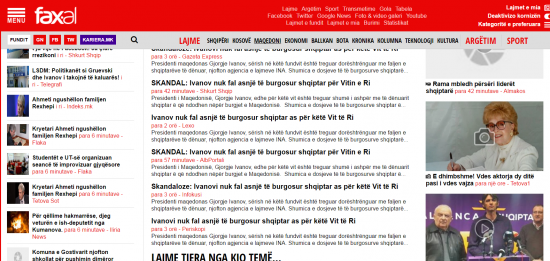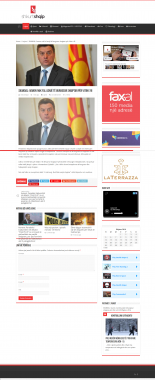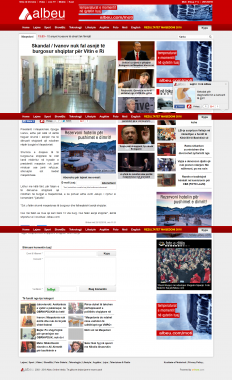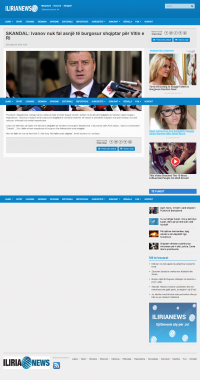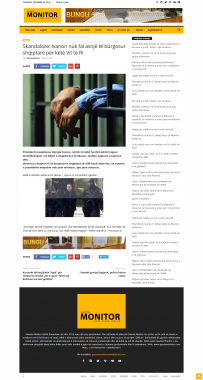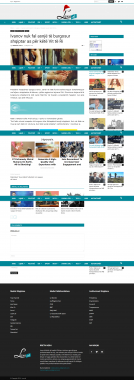“Borrowing” of news ends up like “bush telegraph”
Published in Journalistic Lessons
on 11 - 01 - 2017 Author: Ferikan Iljazi
Author: Ferikan Iljazi
The appearance of “borrowing” of news or daily information among websites, oftentimes without quoting the original or quoting it inappropriately, is prevalent in Macedonia. To begin with, it’s enough just to see the first title that shows up in the news aggregators, which later is repeated by at least 15 different websites.
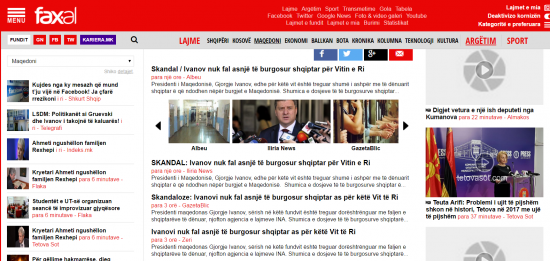
Often, there isn’t even an attempt to change neither full stop nor a comma in the borrowed news. Even if the articles are published with errors, they are republished by the second, third, fourth medium with the same errors. All of this points out to at least two things: there is a battle for filling the categories without the proper effort that the newsroom should put, as well as click battle.
Some websites at least try to alter the title of some of the borrowed news, whereas others are not even “ashamed” by copying the entire article without telling where they took it from. They annex it and at the end they put their medium’s signature…
What strikes the eye, and is one reason more for writing this lesson, is one daily news, which turned out to be one more misinformation. Stimulated by the aforementioned hunger for clicks, great deal of websites republished the news that, allegedly, the President of Macedonia amnestied no Albanian prisoners, without offering elements of surety and confirmation, without any effort to confirm the information, without any correction at all.
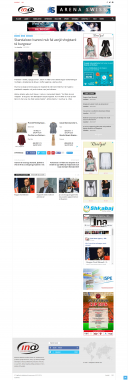 Everything began with the Ina website, which published this information as truth and it included a statement given by the prisoner called “Commander Chakala”. After the news was published, this website without the slightest effort put in this news, created an enchanted circle of publications borrowed by other websites that nobody could have left it.
Everything began with the Ina website, which published this information as truth and it included a statement given by the prisoner called “Commander Chakala”. After the news was published, this website without the slightest effort put in this news, created an enchanted circle of publications borrowed by other websites that nobody could have left it.
The first news related to this topic says:
“The President of the state, Gjorgje Ivanov, again, at the end of the year, demonstrated his stinginess when it comes to the pardoning of convicted Albanians, news agency INA says.
Most of the files of Albanian prisoners that reached Macedonian President’s desk are not approved or are rejected.
This is also confirmed by Avdil Jakupi, known as Commander Chakala. “Plenty of Macedonian prisoners were pardoned today, but unfortunately, not a single Albanian. They didn’t even pardon me, and I have spent 13 years behind bars. They didn’t pardon a single Albanian”, he stated angrily”.
And this has been the most popular or one of the most clicked articles that particular day. There are websites that have tried to alter it a bit, by changing the title, “SCANDAL” or “SCANDALOUSLY”, or have put the word “SCANDALOUSLY” completely out of order. But, they republished the article’s content and the prisoner’s statement completely, without removing any punctuation mark. However, the truth seems to be different.
According to what we were able to read in RM’s Official Gazette, published on the Akademik website, at least 19 persons are Albanians. Probably there are more Albanians among the names that are not underlined, but relying only on the names and surnames of persons for whom we are certain that are Albanians, there are 19 members of the Albanian ethnic community who were pardoned by the President (click and enlarge the photo to see the names).
What becomes additionally apparent is the fact that plenty of websites from Albania and Kosovo, which mainly take news from Macedonia as is, and show insufficient interest and ability to confirm daily information, were caught in the “trap”. Hence, this issue will create false reality in the eyes of our countrymen beyond the state borders of Macedonia.
The Guidebook on Ethics in Journalism contains one separate item that prescribes or recommends how information ought to be confirmed.
- Journalists’ first obligation is the truth
It’s in the basis of the democratic societies that their citizens ought to have access to reliable and accurate facts set on one prudent and comprehensible context. Journalism is one of the instruments that allow this. Journalists are not searching for the truth in an absolute philosophical, yet in a practical manner. This “journalistic truth” is a process that begins and involves collection and verification of facts. Journalists ought to be as transparent as possible regarding the sources and methods they utilize. This will allow the audience to form personal evaluation about the information. Even in the world of majority of opinions, accuracy is the foundation for building the entire history of journalism – contexts, evaluation, comments, criticism, analysis and debates.
2. Confirmation of facts is the essence of journalism
Journalists rely on one of the most substantial processes in their work – confirming or proving the information. When the concept of objectivity in this profession appeared, it didn’t imply that journalists are prejudice-free. However, objectivity and balance are needed so the truthfulness of information won’t be jeopardized due to the cultural and personal stereotypes of journalists. Methodology is objective, not the journalist. The search for as many witnesses as possible, as many appropriate sources as possible, the opening of the opportunities for presenting the attitudes of multiple sides – are steps that demonstrate the standards of objective journalism. These instruments for verifying and proving, distinguish journalism from other communication forms, such as propaganda, fiction or entertainment.
Find the published articles regarding this news as an attachment below, which will help you to confirm all of the above. (Click the photos to enlarge).
This journalistic lesson was created within the framework of the USAID Media Strengthening in Macedonia Project - Media Fact-Checking Service Component,, mplemented by Metamorphosis. The journalistic lesson is made possible by the generous support of the American people through the United States Agency for International Development (USAID). The contents are the responsibility of its author and do not necessarily reflect the views of Metamorphosis, USAID or the United States Government. For more information on the work of USAID in Macedonia please visit its website (http://macedonia.usaid.gov) and Facebook page (www.facebook.com/USAIDMacedonia).



